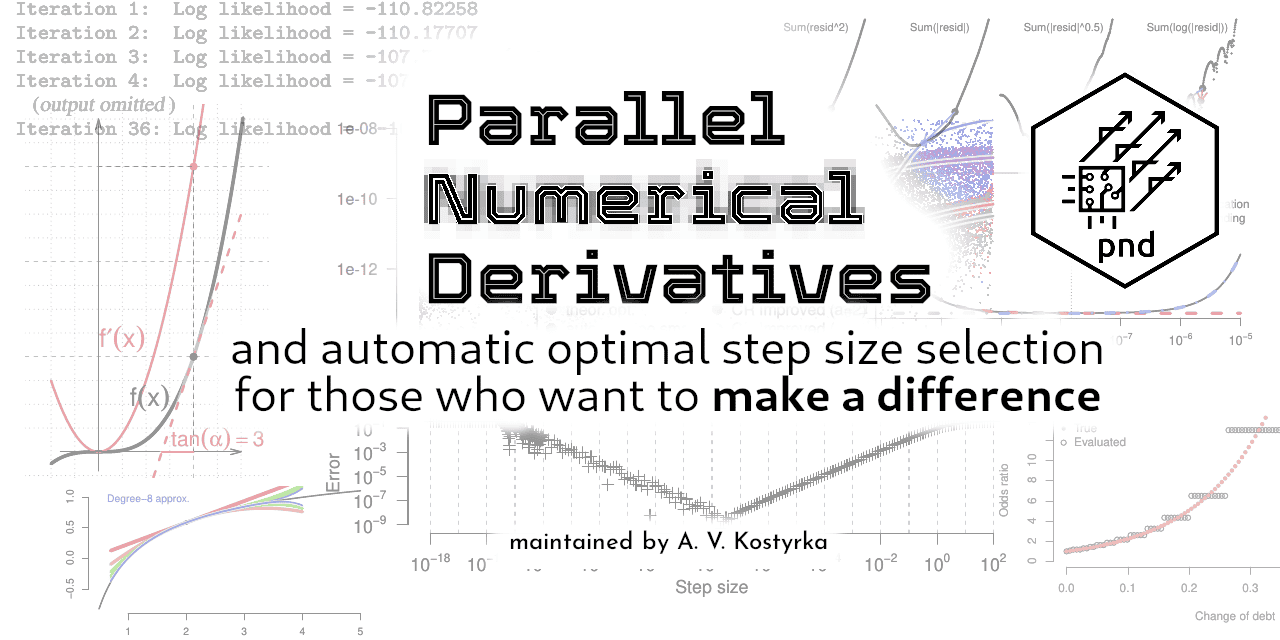An R package for computing fast and accurate numerical derivatives.
In the past, I was using numDeriv to compute numerical gradients. However, the results were not stable for some function, and I could not investigate the source of this instability. Different step sizes yielded different results. Small step sizes were sometimes better, sometimes worse.
The pnd package was designed to offer a comprehensive tool-kit containing popular algorithms for finite differences, numerical gradients, Jacobians, and Hessians.
Optimal step sizes and parallel evaluation of numerical derivatives translate directly to faster numerical optimisation and statistical inference.
- Robust numerical differentiation: effortlessly compute derivatives while controlling the accuracy-speed trade-off.
- Gradient and Hessian calculations: obtain the direction and curvature required by most quasi-Newton optimisation algorithms.
- Parallel capabilities: evaluate multiple values under the best parallelisation scheme that reduces overhead. For example, on a 12-core machine, a 4th-order accurate Jacobian of a 3-dimensional function takes almost the same amount of time as one function evaluation.
- Optimal step size selection: obtain adaptive step size to ensure the best trade-off between mathematical truncation error and computer floating-point rounding error for the best overall accuracy.
- Six optimal step selection algorithms: choose between Curtis–Reid (1974) and its modern (2025) modification, Dumontet–Vignes (1977), Stepleman–Winarsky (1979), Mathur (2012), and Kostyrka (2025) algorithms. Future versions will feature parallelised algorithms.
This package has numDeriv-compatible syntax.
Simply replace the first letter of numDeriv commands with a capital one to get the improved commands: Grad, Jacobian, and Hessian.
Here is how to compute the gradient of f(x) = sum(sin(x)) at the point x = (1, 2, 3, 4).
f <- function(x) sum(sin(x))
x <- 1:4
names(x) <- c("Jan", "Feb", "Mar", "Apr")
numDeriv::grad(f, x)
#> 0.5403023 -0.4161468 -0.9899925 -0.6536436
pnd::Grad(f, x)
#> Estimated gradient:
#> Jan Feb Mar Apr
#> 0.5403 -0.4161 -0.9900 -0.6536
#> (default step size: 6.1e-06, 1.2e-05, 1.8e-05, 2.4e-05).The output contains diagnostic information about the chosen step size.
Our function preserved the names of the input argument, unlike grad.
The default step size in many implementations is proportional to the argument value, and this is reflected in the default output.
Should the user desire a fixed step size, this can be easily achieved with an extra argument named h:
pnd::Grad(f, x, h = c(1e-5, 1e-5, 1e-5, 2e-5))
#> Estimated gradient:
#> Jan Feb Mar Apr
#> 0.5403 -0.4161 -0.9900 -0.6536
#> (user-supplied step size: 1.0e-05, 1.0e-05, 1.0e-05, 2.0e-05).Finally, it is easy to request an algorithmically chosen optimal step size -- here is how to do it with the Stepleman--Winarsky (1979) rule, named "SW", that works well in practice:
pnd::Grad(f, x, h = "SW")
#> Estimated gradient:
#> Jan Feb Mar Apr
#> 0.5403 -0.4161 -0.9900 -0.6536
#> (SW step size: 5.0e-06, 1.0e-05, 7.5e-06, 1.0e-05).Extensive diagnostics requested at any time: the step-search tracing information is saved in the attr(pnd::Grad(...), "step.search") attribute that has an $iterations element.
The numerical gradients and Jacobian are simple numeric vectors and matrices with attributes that facilitate printing -- feel free to handle them as any other numeric object.
- PDF of a 2025 presentation at the University of Luxembourg.
- PDF of an early 2024 presentation at the University of Luxembourg. (Obsolete – check the one above or the vignettes for up-to-date examples!)
This package is supported by 3 vignettes:
- Kostyrka, A. V. Fast and accurate parallel numerical derivatives in R. In progress.
- Kostyrka, A. V. Compatilibility of pnd with the syntax of numDeriv. In progress.
- Kostyrka, A. V. Step-size-selection algorithm benchmark. In progress.
The following articles provide the theory behind the methods implemented in this package:
- Kostyrka, A. V. (2025). Step size selection in numerical differences using a regression kink. Department of Economics and Management discussion paper No. 2025-09, University of Luxembourg.
- Kostyrka, A. V. (2025). What are you doing, step size: a survey of step-size selection methods for numerical derivatives. In progress.
- Kostyrka, A. V. (2025). In the steps of central differences: improved algorithms for numerical derivatives. In progress.
The stable version is on CRAN. To install it, run the following line:
install.packages("pnd")The development version is available on GitHub. To install it, run the following two commands:
install.packages("devtools")
devtools::install_github("Fifis/pnd")To load this package, include this line in the code:
library(pnd)This package is almost dependency-free; the parallel library belongs to the base
group and is included in most R distributions.
This software is released under the free/open-source EUPL 1.2 licence.
